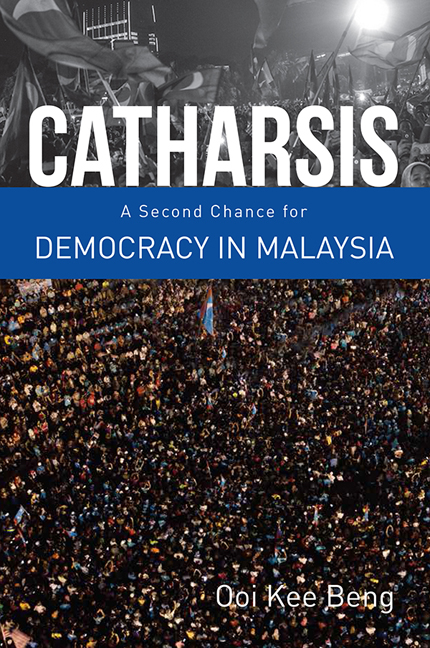Book contents
- Frontmatter
- Contents
- Foreword
- 1 Introduction – Malaysia's Future Is Redeemed
- Before Pakatan Harapan
- Before 9 May 2018
- 12 Racialising the Un-racialisable: What Is the Red Shirt Rally All About?
- 13 One Country's Merdeka Is Another's Damage Control
- 14 Malaysia – Where Politics Must Be Ethnically Inclusive and Exclusive at the Same Time
- 15 Is Malaysia at a Crossroads or in a Quagmire?
- 16 Unity Without Solidarity Sows Disunity
- 17 UMNO and Looking Back at History
- 18 Sarawak Forces Federal Opposition to Do Deep Soul-searching. But Can It?
- 19 By-elections Reveal New Malay Politics
- 20 Interview with Mahathir Mohamad: ‘People Must Be Able to Hold Their Heads Up.’
- 21 Malaysia Has to Start Re-examining Its Histories
- 22 Waves from US Probe into 1MDB May Turn into Tsunami
- 23 Seeking a New Formula to Unite Malaysia's Diversity
- 24 Time for Anwar to Accept Mahathir's Olive Branch?
- 25 Najib, Mahathir and the Timing of Malaysia's Polls
- 26 Excessive Governance Is Not Good Governance
- 27 Why Malaysia's Opposition Will Take to the Streets Again
- 28 Merdeka is About The Individual, Too
- 29 A Battle Between Malay Leaders Over Malaysia's Future
- 30 The Primacy of Political Economy in Asia
- With Mahathir at the Helm
- Beyond 9 May 2018
- About the Author
13 - One Country's Merdeka Is Another's Damage Control
from Before 9 May 2018
Published online by Cambridge University Press: 12 February 2019
- Frontmatter
- Contents
- Foreword
- 1 Introduction – Malaysia's Future Is Redeemed
- Before Pakatan Harapan
- Before 9 May 2018
- 12 Racialising the Un-racialisable: What Is the Red Shirt Rally All About?
- 13 One Country's Merdeka Is Another's Damage Control
- 14 Malaysia – Where Politics Must Be Ethnically Inclusive and Exclusive at the Same Time
- 15 Is Malaysia at a Crossroads or in a Quagmire?
- 16 Unity Without Solidarity Sows Disunity
- 17 UMNO and Looking Back at History
- 18 Sarawak Forces Federal Opposition to Do Deep Soul-searching. But Can It?
- 19 By-elections Reveal New Malay Politics
- 20 Interview with Mahathir Mohamad: ‘People Must Be Able to Hold Their Heads Up.’
- 21 Malaysia Has to Start Re-examining Its Histories
- 22 Waves from US Probe into 1MDB May Turn into Tsunami
- 23 Seeking a New Formula to Unite Malaysia's Diversity
- 24 Time for Anwar to Accept Mahathir's Olive Branch?
- 25 Najib, Mahathir and the Timing of Malaysia's Polls
- 26 Excessive Governance Is Not Good Governance
- 27 Why Malaysia's Opposition Will Take to the Streets Again
- 28 Merdeka is About The Individual, Too
- 29 A Battle Between Malay Leaders Over Malaysia's Future
- 30 The Primacy of Political Economy in Asia
- With Mahathir at the Helm
- Beyond 9 May 2018
- About the Author
Summary
It takes two hands to clap; there is no shore unless there is sea; and one man's ceiling is another man's floor, as the poet rightly claims.
You get the point. There is always a bigger picture, and that bigger picture always changes the picture, as it were. More key players are always involved, more historical trends are always being played out; and more overlapping and contesting agendas are at play than meets the eye.
It is like piecing together a puzzle. To gain a fuller insight into Malaysia's attainment of independence, we need to view the adjacent pieces as well. And the piece that cannot be ignored is the one involving the retreating colonial masters, the British.
On one side, we have the chain of interwoven events known to all Malaysian schoolchildren, which led to Merdeka. Tunku Abdul Rahman shouting ‘Merdeka’ seven times at the stadium in Kuala Lumpur on 31 August 1957 was in orchestration reminiscent of Mao Zedong screaming ‘The Chinese people are finally back on their feet!’ eight years earlier at Tiananmen Square in Beijing; and to be sure, of many other such ceremonies where national independence and liberation were declared.
But such were the times. The 1940s, 1950s and 1960s were an era when nation states sprouted into being like mushrooms all over Africa and Asia. What this excess of cases in so short a time has meant is that the uniqueness of each case, and the legacy and lasting significance of the conditions configuring the post-colonial system of government particular to each country, tended to be disregarded. Yet, it is these conditions that have to be considered if we are to understand the now half-century or so in the history of each of these countries and if we are to identify the elements particular to each case, which have been leaving the most lasting impact.
On the other side, we have the British withdrawal to wonder about. This closing down of empire was a pan-global one and the sun would soon never rise again on the British Empire, let alone set on it. The First World War and Second World War had been fought within a span of three short decades and although the British emerged victorious, the costs were such that the Empire could not hope to win the ensuing peace.
- Type
- Chapter
- Information
- CatharsisA Second Chance for Democracy in Malaysia, pp. 44 - 47Publisher: ISEAS–Yusof Ishak InstitutePrint publication year: 2018



